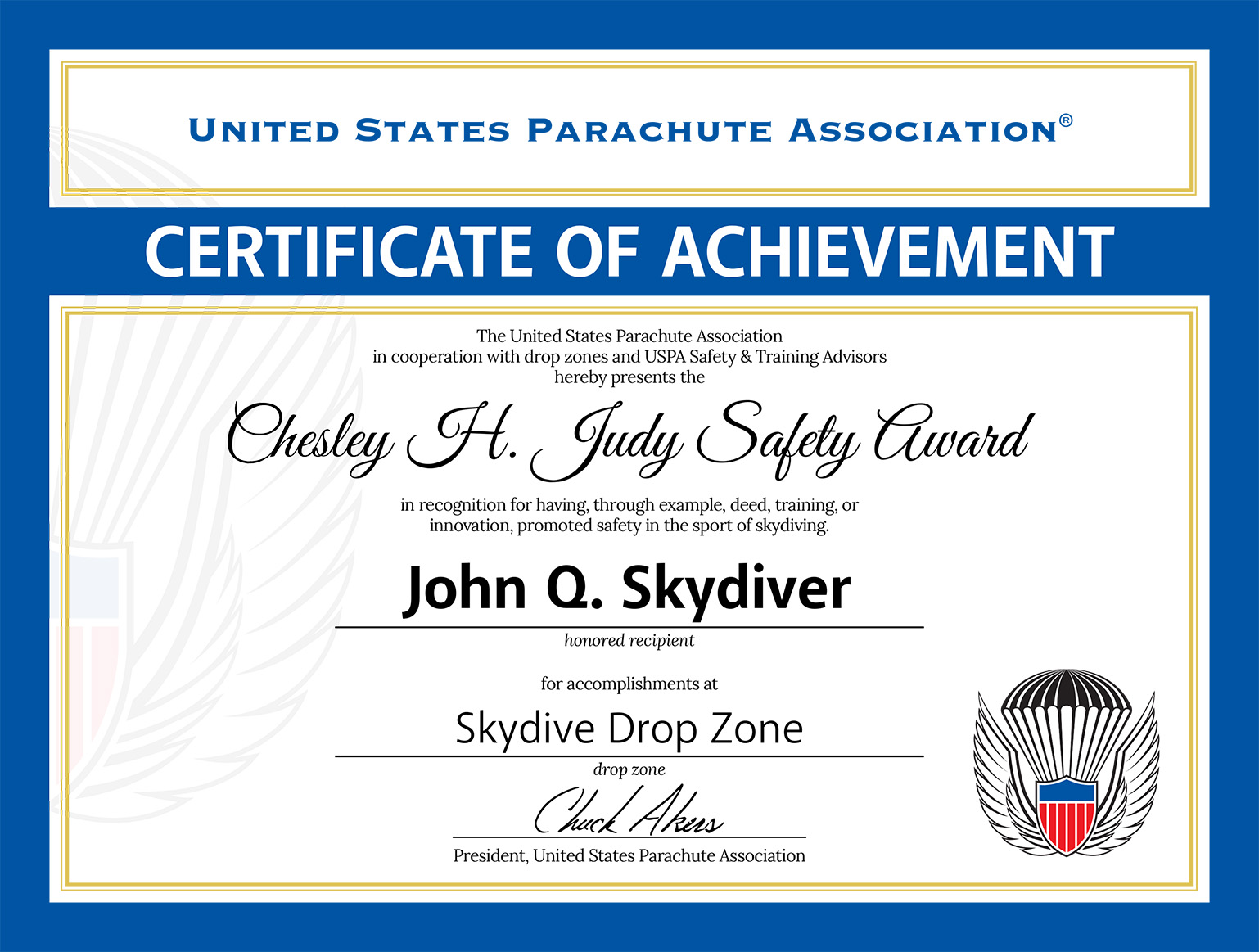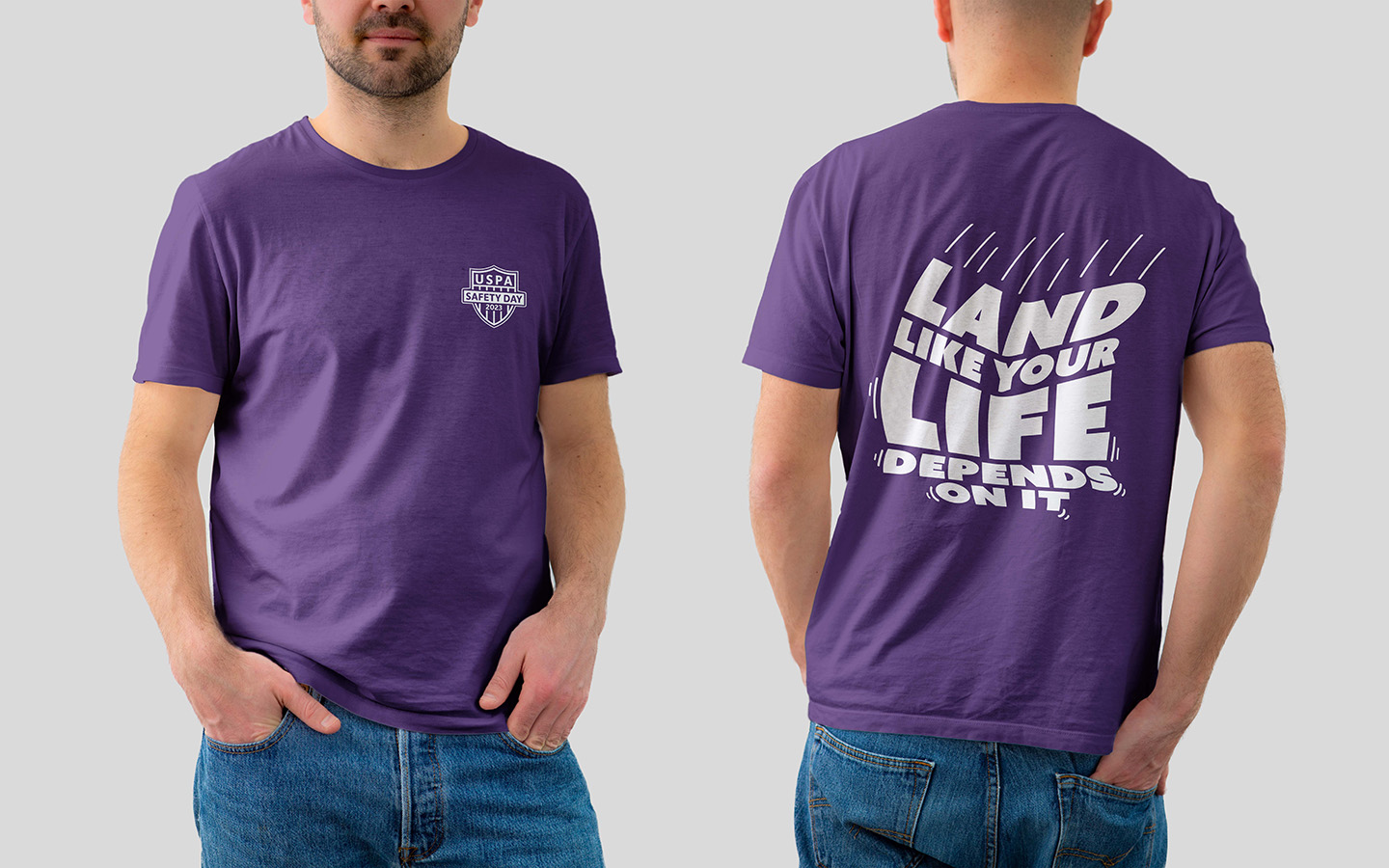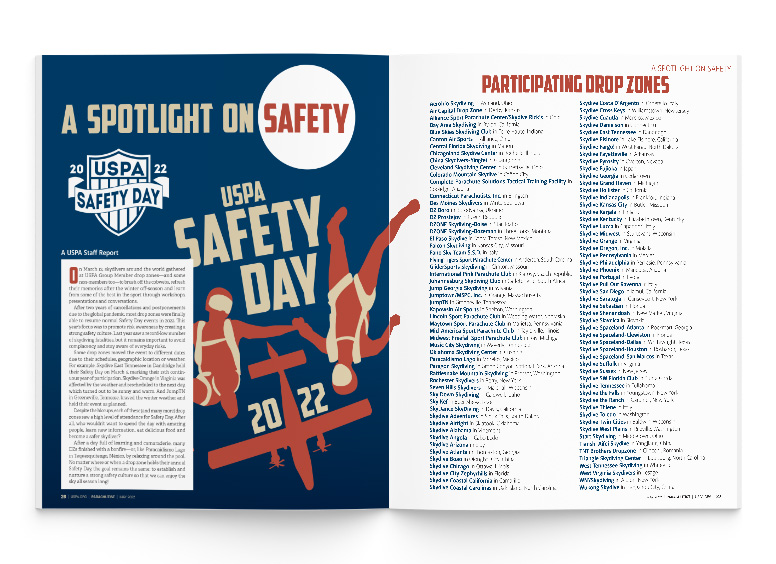 A Parachutist Special Section
A Parachutist Special Section
In 2022, the skydiving community suffered the deadliest year in more than five years, and—as in most years—the majority of the fatalities were related to the failure to safely land a fully functional canopy. So, this year for Safety Day, we’re asking Safety and Training Advisors, drop zone operators or anyone else who is planning an event to put some extra focus on landings.
Focus on Landings
Poor landings are a problem for new jumpers, highly experienced jumpers and everyone in between, so tailor your presentations to address the problems you’ve seen at your own DZ. In the past 10 years, about 50% of injuries and fatalities in the sport are due to two types of low turns—intentional (building speed for landing) and unintentional (usually obstacle avoidance or turning to face the wind)—which involve distinctly different training solutions. Presenters can choose to address these two types of low turns in separate seminars or together (as long as they spell out the different strategies for combatting each type).
USPA has posted several PowerPoint presentations at uspa.org/safetyday that you can use to educate skydivers about the risks of low turns and how to avoid them:
- 2022 Fatality Summary (available by March 1)
- Canopy Emergency Procedures Below 2,000 feet
- Canopy Collisions (How to avoid them)
Address Wing Loading
It is important to note that every sport jumper involved in a low-turn fatality (whether intentional or unintentional) in 2022 (as of November) exceeded the canopy-size recommendations based on experience and exit weight that USPA has added to Skydiver’s Information Manual Section 5-3. Jumpers who stayed within the guidance still had incidents that led to injury, but they were less severe. To help jumpers understand the effect wing loading can have on the outcome of accidents:
- Review the Injury Severity Index from “The 2021 Non-Fatal Incident Summary” (May 2022 Parachutist), which uses a scale from 0 (no injury) to 5 (fatal) to rate the outcomes of incidents. Have the jumpers estimate where they might fall on the injury spectrum if they have landing incidents at their current wing loadings. Findings from the 2021 incident summary showed that wing loadings of 1.67:1 averaged 1.75 on the ISI, whereas wing loadings of 2:1 averaged 2.75 on the ISI.
- Have members complete the Canopy Risk Quotient quiz, compare results and discuss the differences and risks they are assuming with their choices.
Include Instructors!
An unforgivable subset of intentional-low-turn injuries last year involved tandem instructors who violated a USPA Basic Safety Requirement by performing turns of more than 90 degrees to landing. As of November, more tandem student fatalities occurred in 2022 due to low turns than in any year since 1999. USPA is aggressively disciplining instructors for BSR violations, as well as those in leadership who ignore their behavior. Review the BSRs with all instructional rating holders. Review tandem EPs with all tandem instructional rating holders. Delegate blocks of time for rating holders to speak during Safety Day.
Safety Day is an essential start to the season where leaders can play a significant role. These individuals should focus on leading a discussion rather than dictating policies. Community involvement is vital. To this end, consider:
- Reviewing “How Healthy is your DZ’s Safety Culture?” (September 2022 Parachutist) with attendees. Define your strengths and weaknesses. How can you build on your strengths and improve on your weaknesses in your Safety
 Culture?
Culture?
- Setting up a survey before Safety Day to get your jumpers’ suggestions on topics. The USPA Safety and Training Department can help you with this.
Finally, take the time to reinforce safety standards as the season marches on. Keeping your DZ’s standards at the forefront of its culture will help bolster an already-risk-aware community’s devotion to safety.
Recognizing Safety Leaders Helps Build Safety Culture
It’s important to recognize those individuals who positively influence those around them. Awarding the Chesley H. Judy Safety Award is an excellent way to identify role models. Choose someone from your DZ who “through example, deed, training or innovation, has promoted safe skydiving in a substantive way.” This type of recognition can spark the flame that drives your DZ’s safety culture toward an injury-free year. February 15 is the deadline for submissions. Select a recipient for the award, and USPA will mail you a certificate suitable for presentation. Send the name of the recipient, the name of the drop zone and the preferred mailing address to safety@uspa.org.
Increase Participation
 Don’t forget to register your event at uspa.org/safetyday. This list of participating drop zones helps jumpers find an event near them and informs them of the DZ’s alternate Safety Day date if it doesn’t fall on March 11. Submitting a listing also ensures that your DZ will be mentioned in the report on Safety Day in the May issue of Parachutist.
Don’t forget to register your event at uspa.org/safetyday. This list of participating drop zones helps jumpers find an event near them and informs them of the DZ’s alternate Safety Day date if it doesn’t fall on March 11. Submitting a listing also ensures that your DZ will be mentioned in the report on Safety Day in the May issue of Parachutist.
You can order newly redesigned T-shirts—this year in purple with the “Land Like Your Life Depends on It” logo—from Jumper Sportswear for just $6.50 each (add $2 for XXL; $3 for XXXL) plus shipping. You can order as few or as many shirts as you would like. For orders of 12 or more shirts, drop zones can add their logos to the sleeves at $1.50 more per shirt. Many drop zones order the shirts in bulk as gifts for their local jumpers. Jumper Sportswear must receive your order no later than February 17 for events held on March 11 or at least three weeks in advance of your alternate event date. Contact Lynne Smith at lsmith@uslogo.net or call (316) 264-1321 to place your order.
Get Recognition
 A list of all participating drop zones, photos of the Ches Judy Award recipients, a report on any new or innovative ideas and a selection of the day’s best snapshots will appear in the May issue of Parachutist. Drop zones must submit reports and photos by March 23 to be considered for print publication. Submissions should be made via the form found at uspa.org/safetyday.
A list of all participating drop zones, photos of the Ches Judy Award recipients, a report on any new or innovative ideas and a selection of the day’s best snapshots will appear in the May issue of Parachutist. Drop zones must submit reports and photos by March 23 to be considered for print publication. Submissions should be made via the form found at uspa.org/safetyday.